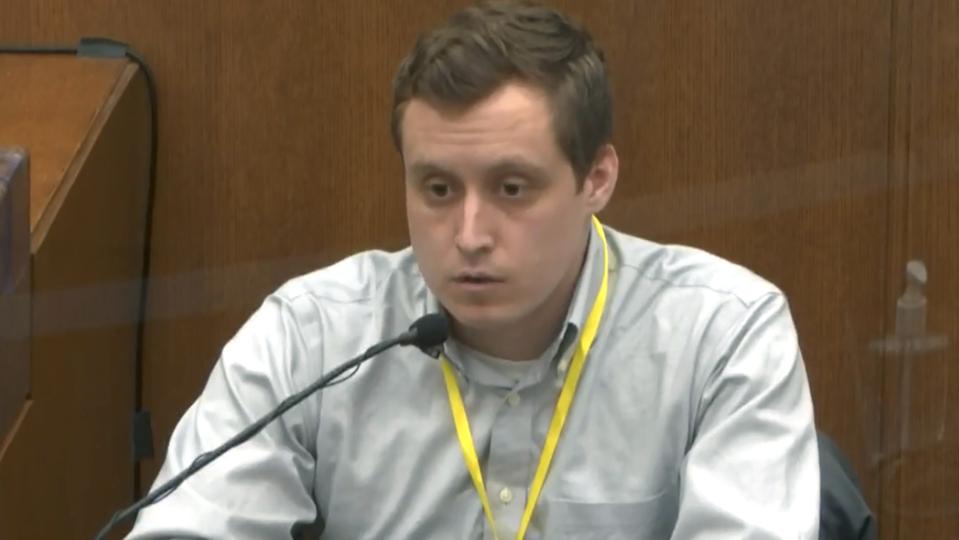[ad_1]
Topline
The emergency care doctor who treated George Floyd after his May 25 arrest testified on Monday at the trial of Officer Derek Chauvin that he believed Floyd’s death was caused by oxygen deficiency (asphyxia) as opposed to a heart attack, a statement which supports the prosecution’s case that Floyd died as a result of “excessive force” used by police.

Witness Dr. Bradford Wankhede Langenfeld, the doctor who pronounced George Floyd dead, testifies as … [+]
Key Facts
Dr. Bradford Langenfeld, who treated Floyd when he was brought to the Hennepin County Medical Center, testified that he was in a state of pulseless electrical activity (PEA), when someone does not have a pulse but still has some electric activity detected by hospital monitors, while in his care.
The PEA state is most commonly caused by hypovolemia (blood loss) and hypoxia (low oxygen), Langenfeld said, but he could not find any indication that Floyd was bleeding in a way that would’ve caused cardiac arrest.
“Based on the history that was available to me, I thought hypoxia [loss or deprivation of oxygen] was one of the more likely possibilities,” said Langenfeld, who explained that he considered the key known causes of cardiac arrest while examining Floyd.
Langenfeld said he considered but ultimately rejected that Floyd could have died from “excited delirium,” a condition often associated with drug use that is characterized by a sudden onset of aggression and distress, often resulting in sudden death, saying he received no information indicating Floyd had been in that condition.
The doctor also said Floyd did not have the symptoms of a heart attack or the tell-tale signs of a drug overdose, though he noted during cross-examination with Chauvin’s attorney Eric Nelson that fentanyl, the drug found in Floyd’s system, is dangerous because it can suppress breathing.
“I didn’t feel there was a specific toxin for which we could give a medication that would reverse his arrest,” said Langenfeld.
Crucial Quote
“I felt that at the time based on the information I had it was more likely than the other possibilities,” Langenfeld said of Floyd’s death being caused by asphyxia.
Key Background
Monday was the sixth day of the trial of Chauvin, a 19-year veteran of the Minneapolis Police Department facing murder and manslaughter charges for Floyd’s death. Chauvin, and three other officers, pinned Floyd to the ground for over nine minutes as they arrested him for trying to buy a pack of cigarettes with a counterfeit $20 bill. A video of the incident went viral on the internet and sparked months of racial justice and policing reform protests. The defense is arguing that the use of force from police was justified given Floyd’s behavior during the arrest, and is seeking to persuade jurors that Floyd instead died of a drug overdose and underlying health conditions.
What To Watch For
Proving Floyd’s cause of death will continue to be central to the trial. The Hennepin County’s Medical Examiner’s Office found in its autopsy that Floyd died of cardiopulmonary arrest while being restrained and ruled his death a homicide. The toxicology report said Floyd had fentanyl and methamphetamine in his system when he died. A separate autopsy commissioned by Floyd’s family found his cause of death to be asphyxia.
Further Reading
“George Floyd’s Chances Of Survival Dropped 10-15% Every Minute Without CPR, Doctor Testifies” (Forbes)
“Paramedic Testifies George Floyd Was Dead While Derek Chauvin Was Still Kneeling On Him” (Forbes)
[ad_2]